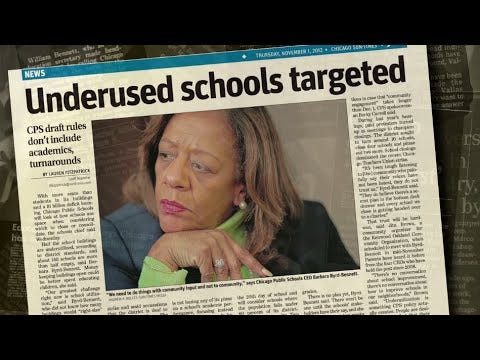Last week Alderman Byron Sigcho Lopez referred, in his recollections of the 2013 school closing battle, to meetings concerning the proposed school actions. He called them “demoralizing.” He was referring to the many “community hearings” scheduled by CPS in early 2013 to “listen” to the folks in the schools that were slated to close.
The “community hearing” is actually a key step in the school-closing playbook. There really is a playbook, created by the Broad Institute. The point of such hearings is to engage and enable stakeholders (parents, students, teachers) to “feel heard” throughout the process. Nevertheless nothing stakeholders say makes the slightest bit of difference, has even the scantest impact. Trust me when I say, people attending these hearings knew that not a single syllable coming out of their mouths was being listened to, and they by no means “felt heard.” Nevertheless then-CPS CEO Barbara Byrd-Bennett said she was sure after so many hearings that “everyone really got it,” about why CPS was closing 54 schools. Though she probably read the guidebook, she never went to one of these forums.
I went to several. They were terrible events. I also wrote about them numerous times in my old blog Chicago Public Fools. The first few I attended were shocking to me—the panel of midlevel bureaucrats sitting stony-faced and unresponding as one after another desperate community member spoke into a microphone asking questions that went unanswered, and reasoning, demanding, and begging that their school stay open. It was a hideous display, nauseating actually.
I’ll share part of the impression I got while attending the second one in my region. Here’s a snip from a Chicago Public Fools post, dated almost exactly ten years ago today, March 5, 2013.
* * * * * * * * * *
Just like the prior forum, this Burnham Park Network gathering was in St. Anselm Catholic Church. …The church was packed, jammed, sardines-in-a-can standing room only.
Like some freakish offspring of Miss America, Survivor, and American Idol, the event showcased the top 24 contenders. The 24 schools who had made the cut now were allowed three people and a few more minutes to make their case not to have their schools shuttered.
Folks really stepped up to the plate. It was like watching 24 home runs out of the park, 24 right in a row.
Kids were bold at the microphone. Kids said powerful, worried, challenging things. How will I walk my little sister to school when I am in high school if they close her neighborhood grade school? How will you protect us as we walk or take the bus to our new school? What is your plan for our schools? I am wondering if now, in 2013, things are going backwards, or forwards?
Parents spoke. Parents brought data. One man had a letter, a few years old now, from Josh Edelman saying, your school will be protected from closings if you let us take away your 6th, 7th, and 8th grades. Now, of course, lacking 6th, 7th, and 8th grades, this school is “too small,” “underutilized.” Parents spoke in graphic terms, invoking images of amputation, cutting, slaughtering, as in, this is what you are doing to our communities. Another: CPS has afflicted the communities of Woodlawn for years.
Pastors took the microphone and implored the midlevel managers to let justice prevail. Aldermen reminded them of their previously assured commitments to these neighborhoods. Teachers stepped forward to give a clear picture of who they were: I was educated at Stanford and I'm a Nationally Board Certified teacher; I chose to come here and to stay here. Or, I taught on the north side for twenty years before I came here; this school is better run and is a stronger community than any I worked at before.
One woman grabbed the microphone and shouted: Why do you keep pushing us around? What do you want from us? I am here to tell you, Enough! Enough! Enough!
It rings in my ears. Enough.
* * * * * * * * * *
Those communities are still being pushed around, still not being served, still partaking of a vastly inequitable school system, and still not being heard. CPS was the Tale of Two Cities in 2013, and it is the Tale of Two Cities today.
This little twelve-minute documentary, “Closed,” gives some helpful context about why south and west side communities had long ago lost trust in CPS and why they already knew their concerns would not be “heard.” Jitu Brown frames it succinctly. “To [the district], our children are collateral damage, they’re expendable. Well, they’re not expendable to us.”
Will a new mayor listen? Will an elected school board—surely, eventually we will have an elected school board—heed the concerns of the community? What will it take for families in disinvested communities to be heard? Ten years ago all our voices couldn’t completely stop a terrible plan. Today, most everyone reading this lives in a community with a public school and I hope, wherever you are, you keep lending what voice you have to the clamor for justice, the fight for equity, the neverending effort to ensure that every district sees no one’s child as expendable.


